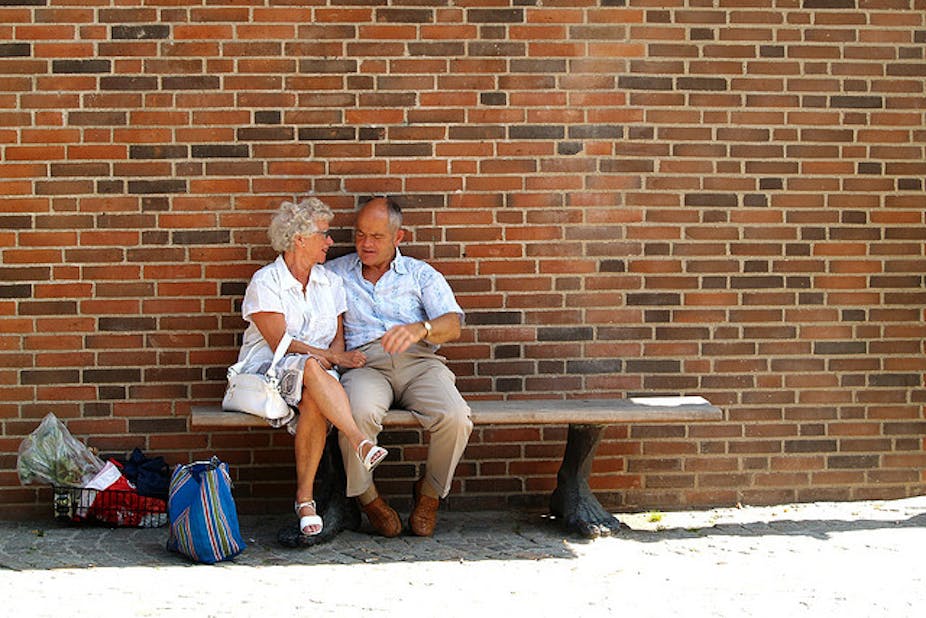At the turn of the 20th century, life expectancy in Australia was just 55 years for men and 59 for women. Thanks to medical breakthroughs and technological advances, the average Australian woman can now expect to live to 84, while life expectancy for men is 79.
Between 2010 and 2050, the number of Australians aged 85 and over is projected to more than quadruple to nearly 1.8 million people. This trend will be a major driver of aged care services over the next 40 years, with important implications for health care and end-of-life planning.
But with the Baby Boomer generation – those born in the post-second World War years – on course to become the face of ageing Australia, it’s likely that the very process of ageing, along with the support and value attached to it, will need to be redefined to keep up with the changes this generation has ushered in over a lifetime.
Ask a Baby Boomer how old they feel and chances are they’ll nominate an age at least ten years younger than they actually are. But that’s no surprise; today’s 60-year-old has had access to comprehensive health care, good nutrition, abundant health information, leading to much better health and well-being outcomes than their parents’ generation.
Many older Australians are delaying retirement and some claim they’ll never retire. Of course, some are working out of necessity, having seen the value of their investments wiped out by the global financial crisis. But their participation in the workforce past the retirement age is testimony to the benefits of good health.
With this new-found sense of longevity comes a redefining of what it means to be and grow old. In a 2011 Nielsen survey which asked participants to define “old”, around a fifth (22%) of respondents thought 80 plus was “old”, while one third (34%) considered 60 to 69 to be “old”.
Could it be that the extension of a person’s active years well into their 80s will inspire a rethink of age-related labels and the values we attach to them? The marketing strategists are already on to this and have started to segment retirees and the elderly into more flattering stereotypes to take account of the Boomer’s consumer clout.

But while there will be plenty of Baby Boomers willing to spend their offspring’s inheritance to ensure a comfortable retirement, there will be plenty more who will not have the means to pay for such luxuries, nor the health to enjoy them.
Age-related illness
A number of acute, chronic conditions are associated with ageing: arthritis, vision impairment, dementia, cardiovascular disease and diabetes. But while there is inevitability to the general trajectory of age, compounded by genetics, ageing is a process that’s susceptible to intervention.
Catching the signs early enough through better screening and prevention is far more cost-effective than waiting until a condition manifests in symptoms. Early intervention also results in much better quality of life for those planning an active retirement.
Take, for instance, Baker IDI’s work on the progressive, incurable genetic cardiovascular disorder Marfan syndrome. There is no cure, but increased understanding of this syndrome, particularly around diagnosis and treatment, has seen the life expectancy of those with Marfan syndrome increase from the mid 40s to the 70s.
The benefits of our increasing capacity to prevent and manage disease is highlighted in a recent report by the British Office for National Statistics which predicts that as many as 35% of the 826,000 babies born in the UK this year will still be alive 100 years from now.
Aged care
Good health, underwritten by science, is just one pillar of successful ageing. Longevity needs to be supported by a shift in the way we structure and deliver services for the elderly.
The next generation of elderly is better educated and more digitally savvy than ever before. Increasingly, they represent a significant block of voters, consumers and retired corporate heavyweights who will demand better services, more accountability and better quality of life in health and accommodation services.
This will necessitate an expansion in the aged care workforce – not just in numbers but in the skills required to service changing expectations about quality of care and accessibility. Health services for the elderly require specific, high-level medical expertise. So it’s great to see the government’s recent focus on aged care issues.
But despite the changes being ushered in by the Boomer generation, our current health system still has a 20th century focus on the management of illness when it arises, as opposed to long-term healthy ageing with a preventive focus.
Ultimately, the best way to tackle diseases of the aged is to tackle the health of the young.
This is an edited version of an article that appears in the latest issue of Perspectives, an opinion-led journal published by Baker IDI Heart and Diabetes Institute.

